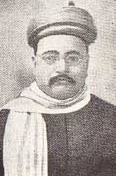| Gopal Krishna Gokhale (1866 - 1915) |
|
Gopal Krishna Gokhale was born on May 9, 1866 at Katulk in Ratnagiri. The economic condition of the family was so bad that on his father's death, he could continue his studies only because his elder brother sacrificed his own education. He took his B.A. degree in 1884 and joined the Law College in Bombay, but could not complete the course.
|
|
Gokhale was greatly influenced by Ranade, whom he regarded as his master in political and public life, Dadabhai Naoroji, who was his hero, and Pherozeshah Mehta. Immediately after his graduation, Gokhale joined the Deccan Education Society, Poona, as a Life Member. When the Fergusson College was opened in 1885, he was called upon to lecture there. He retired in 1902 specifically to devote himself to public life. In 1889 he became a member of the Indian National Congress. In 1890 he was elected Honorary Secretary of the Sarvajanik Sabha, Poona, of which Ranade was the most influential member. In 1893 he became the Secretary of the Bombay Provincial Conference. In 1895 he became Joint Secretary of the Indian National Congress along with Tilak.
|
 |
In 1905 Gokhale founded the Servants of India Society with the object of training men to devote themselves to the service of India as national missionaries and to promote by all constitutional means the national interests of the Indian people. In 1908 he founded the Ranade Institute of Economics.
He was a front rank Reformer, he deprecated the caste-system and untouchability, pleaded for the emancipation of women and championed the cause of female education. In Gokhale's opinion, the introduction of Western education in India, with its liberalising influence, was a great blessing to the people. He was a firm believer in the theory that mass education was a prerequisite to national political consciousness. He advocated that primary education should be free in all schools throughout India at once.
As for Gokhale's ideas on nationalism and the conduct of the nationalist movement. he sought greater autonomy for Indians who would cooperate with the Government in reforms and obtain through constitutional means and by persuasion and advance over the reforms granted until, finally, India became a self-governing Dominion within the British Commonwealth of Nations. While appreciating the benefits of British rule in general, he never failed to criticize unjust policies and high-handed actions of the Government.
In his opinion, the economic results of British rule in India were absolutely disastrous, resulting in frightful poverty. According to him, the greatest need of the hour in India was industrial education. In agriculture, he pleaded that old methods should be changed as much as possible. There was a crying need to introduce agricultural science and improved agricultural implements. Regarding the textile industry, Gokhale acknowledged that the handloom was doing good work and had some future before it, yet the main work would have to be done by machinery. He made extensive use of the public platform for communicating his ideas on social, economic and political reform. Some of his memorable speeches were made in the Imperial Legislative Council, specially on the Annual Budgets from 1902 to 1908.
Among the early figures in the Indian National Congress Gokhale's position was very high. He was feared by the Government and respected by the people. In politics he belonged to the moderate group opposed to the extremist school led by Tilak. He, however, placed equal emphasis on social reform as on political progress. For nearly three decades Gokhale dedicated his rare qualities to the exclusive service of his country and his people in a way which few could lay claim to.
|
|
| |
| Category filed under: Political |
|
|